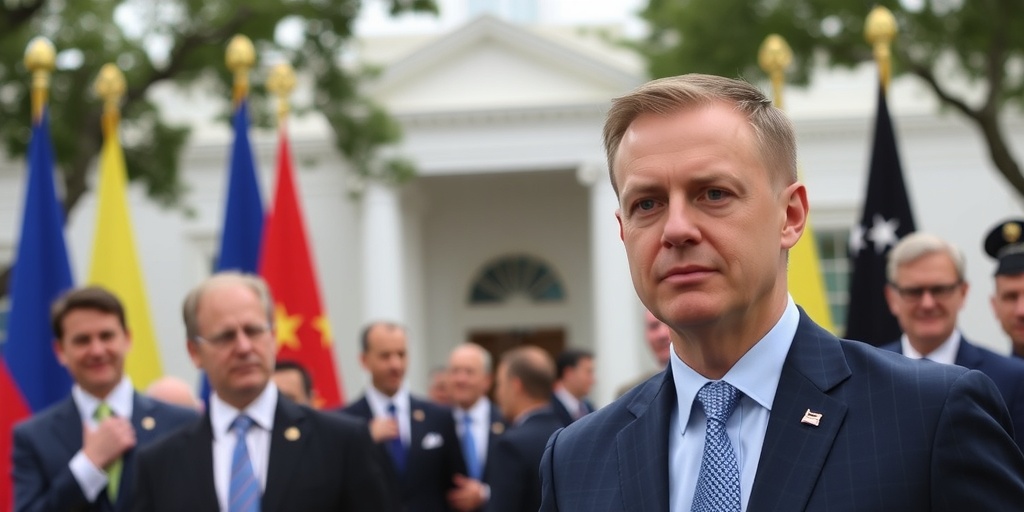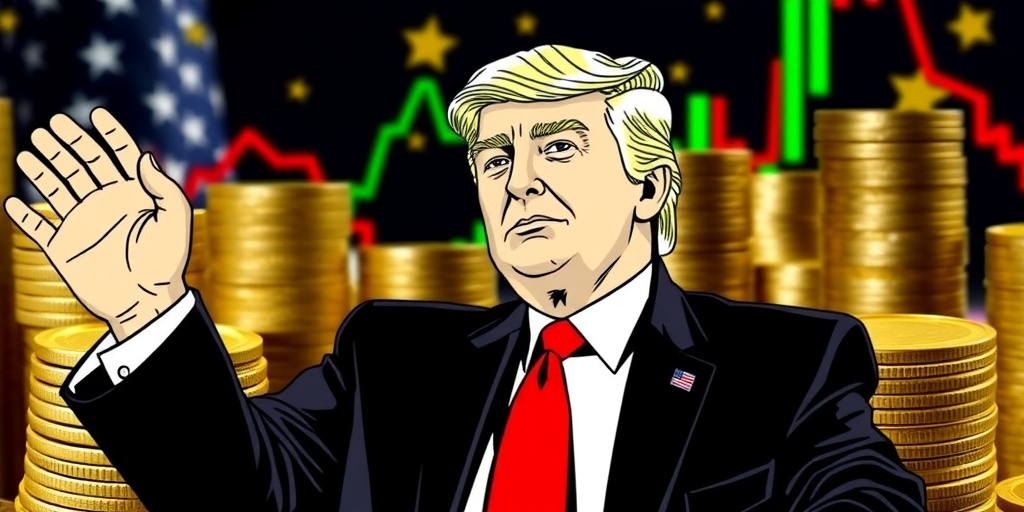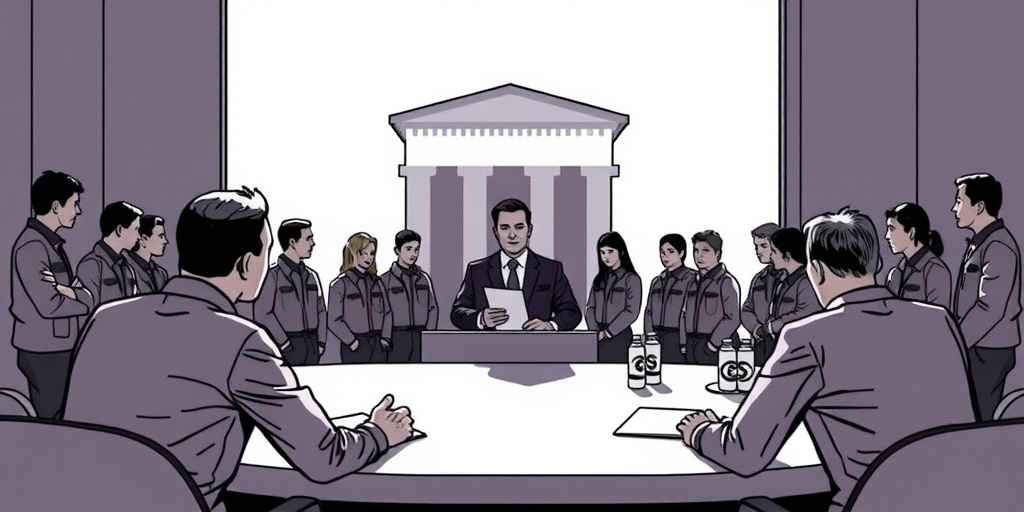Now Reading: Trump’s Foreign Aid Battle: A Loyal Soldier Reemerges
-
01
Trump’s Foreign Aid Battle: A Loyal Soldier Reemerges
Trump’s Foreign Aid Battle: A Loyal Soldier Reemerges

Title: The Disruption of U.S. Foreign Aid Under the Trump Administration
In recent weeks, Pete Marocco, a significant figure at the State Department, has been at the forefront of a controversial initiative to fundamentally reshape the United States’ foreign aid framework. Tasked with overseeing the dismantling of the United States Agency for International Development (U.S.A.I.D.), Marocco’s actions have drawn scrutiny and raised questions about the future of American assistance abroad.
Marocco’s involvement picked up speed soon after a notable interaction with Tristan Azbej, a Hungarian official closely connected to the authoritarian regime of Prime Minister Viktor Orban. During their meeting, Marocco made a striking commitment to halt all U.S. aid programs that are perceived to intervene in Hungary’s internal affairs. Azbej later shared this pledge, indicating a clear alignment between the Trump administration’s foreign policy and Hungary’s increasingly repressive measures against domestic organizations that had received U.S. funding.
The following day, Orban publicly declared that organizations receiving U.S. aid would be labeled “illegal agents,” celebrating Marocco’s collaboration as a breath of fresh air for his government. This instance illustrated a unique partnership between the Orban and Trump administrations, both of which share an antagonistic stance towards independent media and political dissent.
Marocco’s role is not just a reflection of his allegiance to Trump’s foreign policy, but also underscores a broader strategy to wield foreign aid as a tool of diplomacy. By stripping away aid from specific nations, he aims to punish those that do not align with Trump’s vision, while conversely offering assistance to allies. This controversial approach marks a stark departure from the conventional understanding of U.S. foreign aid as a diplomatic instrument aimed at fostering stability and goodwill.
Currently, Marocco is managing the administration’s overarching strategy to reduce federal involvement and dismantle what it perceives as left-leaning policies. His leadership coincides with the Trump administration’s efforts to significantly reduce the scale and impact of foreign assistance—an initiative that has not only drawn backlash but also sparked numerous legal challenges questioning its legality. The foreign aid funding that Trump sought to freeze had already been approved by Congress, leading to several ongoing lawsuits against these directives.
During his recent appointment, there was an immediate and sweeping effect on U.S.A.I.D.’s operations, as Marocco informed approximately 1,400 staff members they were placed on indefinite administrative leave. This directive sent shockwaves through the agency and its foreign service officers, as many were instructed to return to the U.S. within a month’s time. These actions were put on hold following a federal judge’s ruling, declaring the administration’s blanket freeze was based on questionable justification.
Marocco has cultivated a perception of himself as a reformer within the agency, claiming that U.S.A.I.D. has functioned like a rogue entity at odds with Trump’s foreign policy. He has previously described his objectives as ensuring that operations align closely with national interests, a viewpoint shared by influential figures like Secretary of State Marco Rubio, who is keen on making foreign aid more efficient rather than completely eliminating it.
However, troubling patterns have emerged from Marocco’s past. He previously worked at U.S.A.I.D. in a role overseeing the Office of Transition Initiatives—an experience former colleagues describe as a precursor to his current position. While in this earlier role, Marocco instituted strict measures that slowed agency operations, reinforced control, and targeted staff members who expressed dissenting views. His approach sparked an internal memo highlighting significant drops in morale and operational efficiency.
The events of January 6, 2021, also inadvertently tie into Marocco’s narrative as his name surfaced among individuals seen at the Capitol during the insurrection. While he neither confirmed nor denied these allegations, he criticized any inquiry into his involvement as “petty smear tactics.”
As Marocco continues to reshape U.S. foreign aid, the implications of his tenure could be profound. His insistence on controlling expenditures and examining unyielding loyalty among staff may foreshadow a shift toward a more politicized aid framework—one that could diverge significantly from traditional humanitarian objectives.
The evolving role of U.S.A.I.D. under Marocco’s guidance is emblematic of a broader transformation occurring in U.S. foreign policy, marked by a move to use aid as leverage rather than an instrument of goodwill. As this debate unfolds in the halls of power and within the legal system, the future of American foreign aid—and indeed its reputation abroad—hangs in the balance.
Stay Informed With the Latest & Most Important News
Previous Post
Next Post
-
 01New technology breakthrough has everyone talking right now
01New technology breakthrough has everyone talking right now -
 02Unbelievable life hack everyone needs to try today
02Unbelievable life hack everyone needs to try today -
 03Fascinating discovery found buried deep beneath the ocean
03Fascinating discovery found buried deep beneath the ocean -
 04Man invents genius device that solves everyday problems
04Man invents genius device that solves everyday problems -
 05Shocking discovery that changes what we know forever
05Shocking discovery that changes what we know forever -
 06Internet goes wild over celebrity’s unexpected fashion choice
06Internet goes wild over celebrity’s unexpected fashion choice -
 07Rare animal sighting stuns scientists and wildlife lovers
07Rare animal sighting stuns scientists and wildlife lovers





















